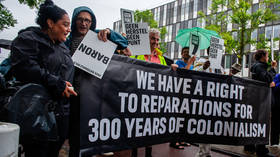EU hints at slavery reparations

Europe’s history of slave-trading constituted a “crime against humanity” and inflicted “untold suffering” on millions, EU leaders announced on Tuesday in a statement that also referenced a 10-point reparations plan. The statement was issued in partnership with the Community of Latin American and Caribbean States following a two-day summit in Brussels.
The EU leaders acknowledged and “profoundly” regretted their countries' roles in the transatlantic slave trade, the statement said, decrying what they described as “appalling tragedies ... not only because of their abhorrent barbarism but also in terms of their magnitude.”
The reparations plan mentioned in the summit statement was drafted by the Caribbean Community (CARICOM) in 2014 and demands that European governments apologize formally and issue financial, sociocultural, and even psychological reparations. “Persistent racial victimization of the descendants of slavery and genocide” is “the root cause of their suffering today,” it explains, calling this “the primary cause of development failure in the Caribbean.”
In addition to canceling the debts of the descendants of victims of slavery on an individual and national level, that declaration calls on EU member governments to finance an “indigenous peoples development program,” cultural and public health institutions for their former colonial properties, literacy programs, and the modernization of Caribbean industries.
The plan stresses the need to reinforce ties with the African communities from which slaves were “stolen” for labor on Caribbean plantations, even calling for repatriation of any descendants of slaves who wish to return to Africa.
While some European leaders had balked at the inclusion of reparations, they were overruled as CELAC president and Saint Vincent and the Grenadines premier Ralph Gonsalves insisted the summit statement must include a mention of “reparatory justice” for the “historical legacies of native genocide and enslavement of African bodies.”
Earlier this month, Dutch King Willem-Alexander issued a formal apology for the Netherlands’ role in the slave trade, adding that racism remains a problem in Dutch society. Prime Minister Mark Rutte made a formal apology of his own in December, stating the Netherlands had played a key role in the Atlantic slave trade and had profited handsomely from it, even as he said the government would not be paying reparations.
In April, Portuguese President Marcelo Rebelo de Sousa said Lisbon should apologize and take responsibility for the role it played in the slave trade, though he did not explain what that would entail. Portugal brought more enslaved Africans across the Atlantic Ocean than any other country during the colonial era – nearly half of the 12.5 million who were forcibly removed from their homeland and brought to the Americas.













